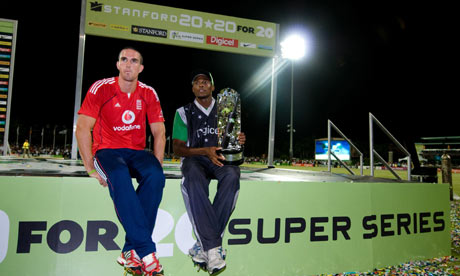
England put in a tepid, technically inept performance and got exactly what they deserved - not a penny
Kevin Pietersen (left) sits with Stanford Superstars' Daren Powell following England's Stanford Super Series defeat. Photograph: Gareth Copley/PA
At least England's team unity will have been maintained. The prospect of large sums of money dished out unequally through the squad had threatened to undermine the corporate spirit. Peter Moores, the coach, can have no qualms on that score now: they all arrived with nothing and, after the roasting they received at the Stanford Cricket Ground on Saturday evening, that is precisely what they will have divvied up when they leave here tomorrow for India.
The England XI got what they deserved. In simple cricket terms they were not even second-rate, offering an insipid, technically inept, strategically bankrupt and mentally flabby performance when the situation demanded excellence. They were outbowled, outbatted and outfielded by an excellent unit who, focusing on a single event, had cast off some mediocre cricket at the start of the week to produce a scintillating all-round team performance. Kevin Pietersen's men appeared novices by comparison. If they had hoped to use this match as a showcase for their credentials to join the Indian Premier League such hopes will have been dashed: Lalit Modi will not be sending out many invitations now.
There have been indications all week that the England squad might not rise to this occasion. Too many gripes and moans - the sort that emanate from those taking a loftier view of themselves than they can justify - have emerged not to have provided a distraction. The hotel was unsuitable (for what?); Sir Allen Stanford had offended them through a bit of harmless byplay with their partners; the host also came blundering unannounced into their dressing room, a sacrosanct place; the pitch was wrong; the lights too low and glary; the outfield like Pietersen's former haircut rather than his current one. In the end they protested too much, garnering cooperation from Stanford but little sympathy.
Better that they had concentrated on the job in hand, with more attention to the way they might play the game. As a humbling debriefing exercise, they might view footage of their own batting efforts against superlative bowling perfectly adapted to the conditions, where pace bowlers opted for a very full length or, from a normal length, took the pace from the ball so that timing was difficult. Spin was bowled to a tight line at the right pace. The England XI countered this miserably and were architects of their own downfall as much as victims of the bowling. Whoever encouraged Matt Prior and Pietersen to attempt the kind of play they did - throwing themselves to the off side, trying to play to fine leg and losing their leg stumps - should be ashamed. Twenty20 cricket promotes unorthodoxy and thinking on the hoof, but not at the expense of the basics when it matters most.
Throughout all this Chris Gayle, the Superstars' captain, maintained total control. He managed his bowling changes with assurance, having no need to call on some of his resources, including himself and the spinner Dave Mohammed, and was able to draw on scintillating, athletic, quicksilver fielding. Perhaps above all was the element of discipline that had been instilled into his team, something which has rarely been a feature of recent West Indies efforts. If that can be maintained, and the elder statesmen in the side can convey to these new stars that an important opportunity is there for them to expand their horizons into other areas of the game, Stanford may just be right in believing that, whatever else his motives, he has helped kick-start a resurgence in the cricketing fortunes of the region.
England are due back here to renew this contest a year from now and they would do well to consider next time how exactly they will approach it. For a start they should forget any semblance of representing "England". There is no contractual obligation to appear or name themselves as such, and although Stanford would prefer "England" to appear in the team's title, strictly as a hook for his attempts to capture the American television market (Saturday's game was shown live on ESPN2, with a potential reach of 90 million), there is room for some creativity. In so doing, they should embrace the Stanford concept as a one-off exhibition match, which is all it ever pretended to be. If this means allowing cameras into the dressing room and the odd bit of back...#8209;slapping from Stanford, then what of it? In no way did such accommodation impede the progress of his Superstars.
The England players have been taught a huge lesson in Antigua: that pride comes before a fall. When the tournament was announced in a tacky but memorably high-profile manner at Lord's, the cash seemed to be in the accounts and being spent. Small things such as choice of tense, done unthinkingly perhaps, make the difference to perception. "How will I spend the money?" rather than "How would I?". England got ahead of themselves.
For those watching in Antigua there was the overwhelming feeling that the right team not only won but won for the right reasons. Graeme Swann will not get his pink Ferrari after all, but he does OK. But for Andre Fletcher, for example, the young wicketkeeper-batsman from Grenada, this result will be genuinely life-changing and for the better. The Superstars worked hard over a long period and they have reaped the reward.
So too, thanks to England's involvement, will countless schools across the region, who will benefit from the Chance to Shine campaign to reintroduce cricket to the curriculum. This has not just been an exercise in self-aggrandisement, publicity and the pursuit of riches. And, by the way, it made for a marvellous spectacle.



No comments:
Post a Comment